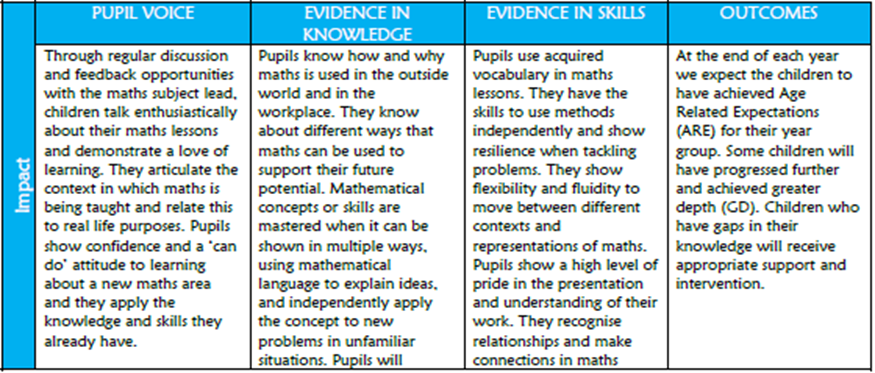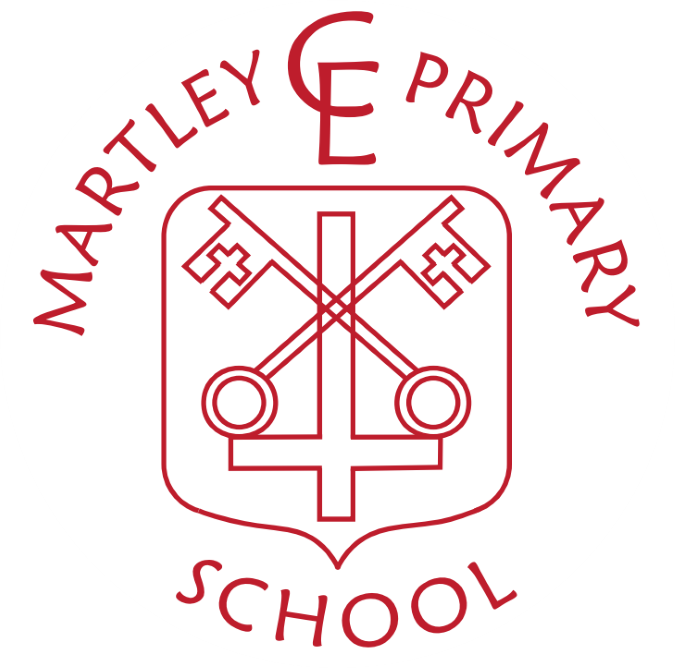Maths
At Martley CE Primary School and Pre-School, we are committed to providing our children
with a curriculum that has a clear intention and impacts positively upon their needs. They will
be given carefully planned opportunities to acquire declarative (factual), procedural
(methodical) and conditional (strategic) knowledge.
Curriculum statement for the teaching and learning of Maths Mastery (created August 2022)
National Curriculum Intent
The national curriculum for mathematics intends to ensure that all pupils:
- Become fluent in the fundamentals of mathematics, including through varied and frequent practice with increasingly complex problems over time, so that pupils develop conceptual understanding and the ability to recall and apply knowledge rapidly and accurately.
- Reason mathematically by following a line of enquiry, conjecturing relationships and generalisations, and developing an argument, justification or proof using mathematical language.
- Can solve problems by applying their mathematics to a variety of routine and non-routine problems with increasing sophistication, including breaking down problems into a series of simpler steps and persevering in seeking solutions. Mathematics is an interconnected subject in which pupils need to be able to move fluently between representations of mathematical ideas.
The programmes of study are, by necessity, organised into apparently distinct domains, but pupils
should make rich connections across mathematical ideas to develop fluency, mathematical reasoning
and competence in solving increasingly sophisticated problems.
Martley CE Primary School and Pre-School Intent
It is our primary intention at Martley to enable children to acquire and apply mastery skills. Children will
also be given opportunities to apply their mathematical knowledge across other curriculum areas.
The intention is that the majority of pupils in each class will move through the programmes of study,
and thereby each lesson as a singular journey, at broadly the same pace. However, decisions about when
to progress will always be based on the security of pupils’ understanding and their readiness to progress
to the next stage. Pupils who grasp concepts rapidly will be challenged through being offered rich
mastery and sophisticated problems before any acceleration through new content. Those who are not
sufficiently fluent with earlier material, will consolidate their understanding, including through additional
practice or designed intervention, before moving on. In addition, pupils are required to explore maths in
depth, using mathematical vocabulary to reason and explain their workings.
Mastery
A wide range of mathematical resources are used and pupils are taught to show their workings in a
concrete, pictorial and abstract form wherever suitable and useful. They are taught to explain their
choice of methods and develop their mathematical reasoning skills. We encourage resilience, adaptability
and acceptance that struggle is often a necessary step in learning. Our curriculum allows children to
better make sense of the world around them relating the pattern between mathematics and everyday
life.
It is our intent at Martley CE Primary School and Pre-School for the children we teach to:
- Make strong connections across mathematical ideas and apply their knowledge and understanding to other subjects,
- Have fluent conceptual understanding of mathematics and to recall and apply their knowledge rapidly and accurately,
- Enhance their mathematical reasoning by following a line of enquiry and developing an argument, justification or proof using clear and convincing mathematical language.
- Be able to solve problems by applying their mathematical knowledge to a variety of situations with increasing sophistication, including breaking them down into a series of simpler steps and persevering in seeking solutions.
Underpinned by:
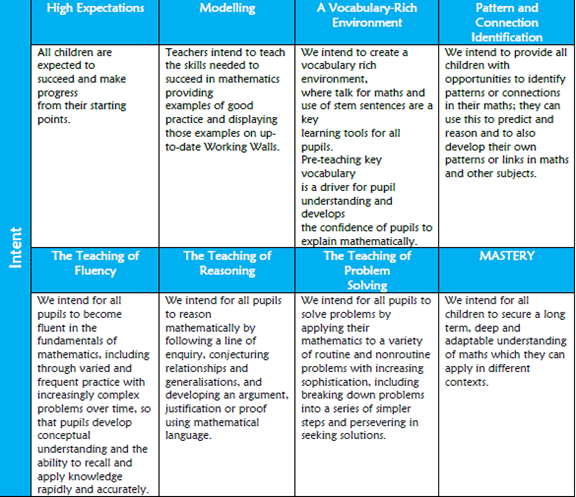
Martley CE Primary School and Pre-School Implementation
At Martley CE Primary School and Pre-School, all pupils receive high quality teaching delivering
appropriately supported and challenging work. The White Rose Maths (WRM) sequences of learning are
broadly followed from Reception to Year 6 where single-age maths lessons take place daily to ensure full
coverage of the National Curriculum. We use a range of fluency (Do It), reasoning and problem solving
(Twist It and Deepen It) question styles to encourage maths mastery from an early age. A wide range of
mathematical resources are used and pupils are taught to show their workings in a concrete, pictorial
and abstract form wherever suitable and useful. They are taught to explain their choice of methods and
develop their mathematical reasoning skills. At Martley, we encourage resilience, adaptability and
acceptance that struggle is often a necessary step in learning.
- Maths is taught for an hour to separate year groups on a daily basis.
- ‘Maths Talk’ prompts and age-appropriate concrete manipulatives to support children are available for pupils to access freely in all classrooms.
- The WRM Flashback4s and carefully selected ‘Solve It Starters’ are used to revisit topics regularly and to ensure children are able to ‘know more and remember more’. These are used at each teacher’s discretion, but often as a starter activity following our ‘soft start’ and always as a separate 15 minute session to the daily maths lesson.
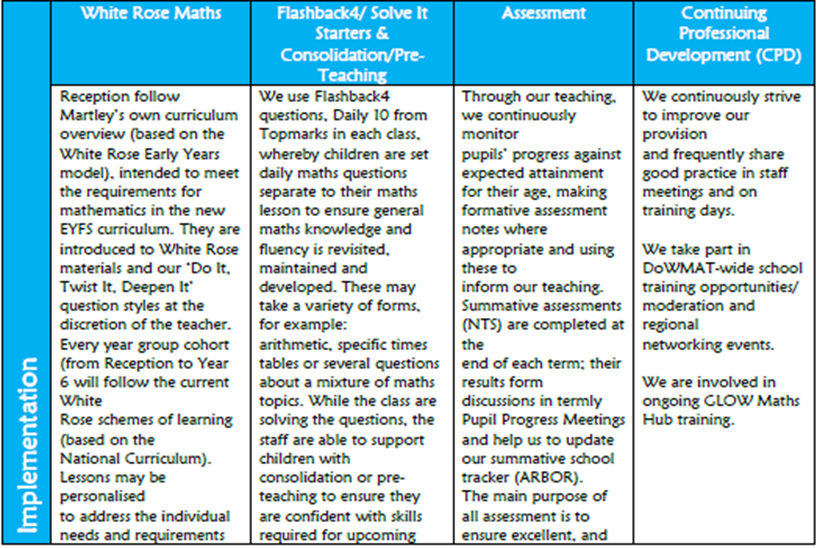
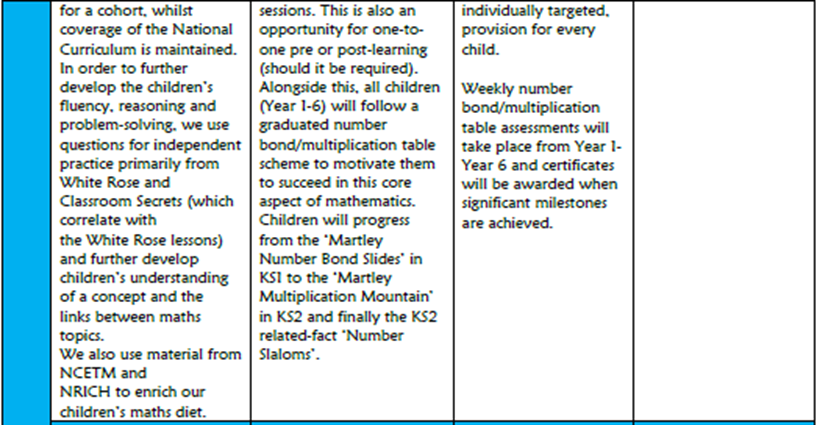
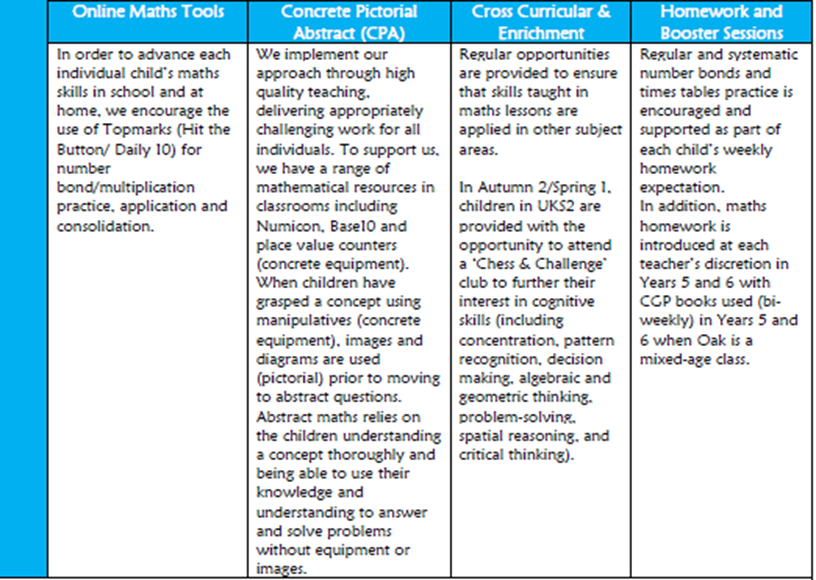
Through our teaching, we continuously monitor pupils’ progress against the expected attainment for
their age and/or stage of conceptual understanding. This is through continual formative assessments for
learning (AfL) during and across each lesson using effectual questioning, effective feedback to move
pupils forward and the provision of next steps for pupils so they know where they are on their maths
learning journey and how to improve.
To ensure robust and rigorous teacher assessments are made, teachers will assess the pupils using ongoing
formative assessment, alongside termly summative NTS assessments – which will provide age-related
outcome predictors, to further support teacher assessments.
Presentation in pupils’ maths books must be of the highest standard possible, at all times, and in line
with the EYFS, KS1 and KS2 presentation expectation guidance documents.
Martley CE Primary School and Pre-School Impact
The impact of this strategy at Martley CE Primary School and Pre-School will be consistent pupil progress
and attainment in maths moving towards the National Standards or above across all key stages.
This will be evidenced through:
- The use of embedded, secure and effective sequences of learning;
- Fidelity to the White Rose SoL and ‘Maths the Martley Way’
- Pupils being ‘ready to progress’ to the next stage in their maths learning journey;
- Pupils being able to rapidly, confidently and accurately recall known number facts;
- Pupils talking enthusiastically and with confidence about the maths they are learning, using the correct acquired vocabulary (and appropriate stem sentences) whilst being able to relate it to real life purposes;
- Pupils having the skills, resilience and a range of strategies, methods and approaches they can employ to help them confidently and independently apply their understanding of maths to problem solve,
- Pupils being proud of, and happy to share, the well-presented work in their maths books.
